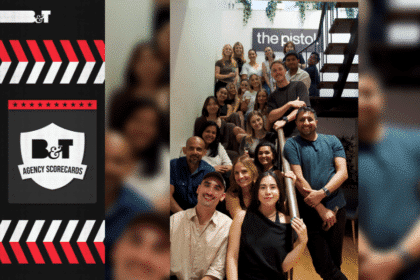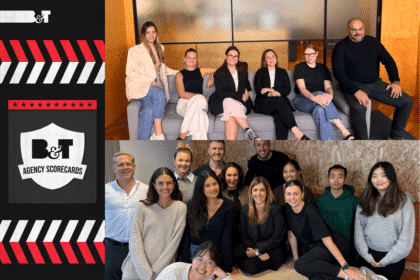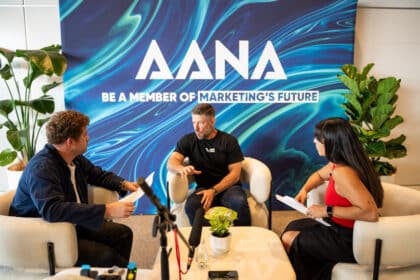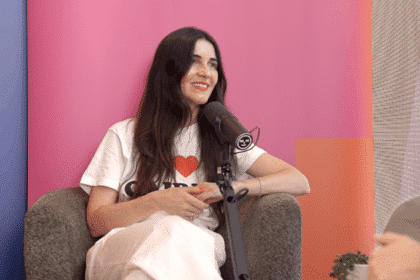In this latest installation of the the Keep Talking series on B&T, Publicis’ chief media officer Imogen Hewitt reflects on her own mental health journey in the face of loss and grief.
Why is it that we never hesitate to ask after the physical health of our friends, family, colleagues or clients, yet shy away from conversations about their mental health? Why do physical health symptoms denote illness, not considered anyone’s fault. Yet, for some, mental health symptoms are seen as weakness and a reflection of our own failing. I wish I knew why. Spoiler: I don’t. And I wish I was not guilty of this kind of thinking. Sometimes, I still am.
We are indoctrinated to believe physical and mental health cannot be considered comparable. This is not just untrue and unkind. It’s dangerous. If we avoid, diminish or ‘laugh it off’, we remove the opportunity for someone to feel safer, talk straighter, connect, seek help and recover.
When people die, tragedies happen or people are really ill, the majority of us just don’t know what to say. Sometimes we say nothing, or we offer platitudes. There’s no shame in this, because if we are not taught, if we don’t understand, then we retract. We kid ourselves that the person suffering is probably well supported elsewhere. We do the same things (or worse) when we get a glimpse of someone in mental health distress. ‘Or worse’ like when you’re asked to take a deep breath, toughen up, or ‘come on now’, delivered by mildly irritated people wishing you’d get on with it.
There is no perfect way, but surely there is a better way than that.
My dad died when he was way too young. He was 67; I was 32. He was my best mate. Confidant. Hero. A total legend of a human. His loss has left me forever altered.
When he died my mum, sister and I sat in a room at St Vincent’s Hospice. The room was cleared, he was taken away, and I started cleaning… Anything to avoid the pain and distract myself from the vulnerability of turning around to see the devastation on my remaining loved ones’ faces. My mum was 17 when she met my dad. They were married for 40 years. He was the good old-fashioned love of her life.
The grief made us all do weird things. My mum went home and threw most of dad’s stuff out; my sister went out, hard; I went to work as soon as I possibly could—deny, avoid, stiff upper lip, pretend.
Thankfully, St Vincent’s offered grief counselling. It started my journey to trying to better understand how to cope. How to be there for people who aren’t coping, and how to gather up my bravery and wade in when someone might need it.
Somewhere in the midst of this grief there was a succession of dreadful events. Some extended family died in a horrific fire; a mate in her twenties had a stroke; my best friend moved to America, taking my longest friendship and my godchildren with her; and my mum had a breast cancer scare. Then I fell pregnant, I had my wedding ceremony at St Vincent’s so my dad could be there, and struggled to connect at all with the small ‘thing’ I was growing… The grief counselling did not prepare me for that, but it did mean I knew I was far from okay and went to the GP.
Less than a year after my dad died, I had a baby girl—back in a hospital bringing life in, rather than watching it fade out.
She was perfect but suffered desperate separation anxiety as a little girl. The kind that meant she wailed at every Kindie drop-off. The kind that had me bawling in the car after leaving her distressed so I could go to work. The kind that people brushed off as ‘normal adjustment’. Not ‘normal’. I trusted my instincts. I acknowledged my feelings and hers. I knew we needed help and pushed through feeling inadequate or overly emotional (or ‘hysterical’, as some called me) to get us the support we needed.
I worked four days a week for a long period that year because Tuesdays were spent at Macquarie University doing the Cool Kids program for anxious children with my little girl. Helping her to gain practical tools for navigating her very real terror. My workplace asked no questions. Allowed me to do whatever I needed. Good intentions from lovely people, but not quite the conversation I would have today.
It’s been years since then. That little girl is now a content and thriving teenager, while her little sister is a neuro-diverse firecracker both set to change the world. They both know they are exactly who they’re meant to be and, critically, understand there’s no shame in treating your brain respectfully and kindly—like our bodies.
Now when I get the feeling that someone is not okay, I have a few go to moves, assisted greatly by my choice to become Mental Health First Aid qualified. I’ll ask, ‘I noticed you didn’t seem yourself today?’ Or ‘I get the feeling you might need a listening ear?’ Or, in circumstances where there is immediate threat, ‘I’m worried about you. I will help you access resources. I will sit with you. I will call anyone you need. I will stay here until we have a plan.’
This all sounds a bit like I think I have this nailed. Nope. I get it wrong all the time. I have assumed people are struggling and been wrong (awkward). I have assumed they are not struggling and been wrong (worse). The most important thing though… I ask out loud and I deliver the question with no more judgement than, ‘Do you need a paracetamol? ‘Because humans get physical headaches, and humans get mental head-aches, and both deserve to be acknowledged.
None of us knows what’s coming, but we do know that hurdles await us all. Which means it’s up to all of us to prioritise making others feel safe and feel heard. At the very least, as Ian Perrin simply and eloquently put it—we have got to keep talking (and in my opinion, keep asking).
Read Ian Perrin’s first piece in the Keep Talking series, or Adam Ferrier’s second. The next piece will be from Kara Gilmore, VP of Carnival Cruise Line. If you would like your business to be involved, or for Perrin to speak to your teams about mental health, please email [email protected]. Or if you would like to sponsor his efforts to run the 89-kilometre Comrades Marathon in his father’s memory, please visit Lifeline.








